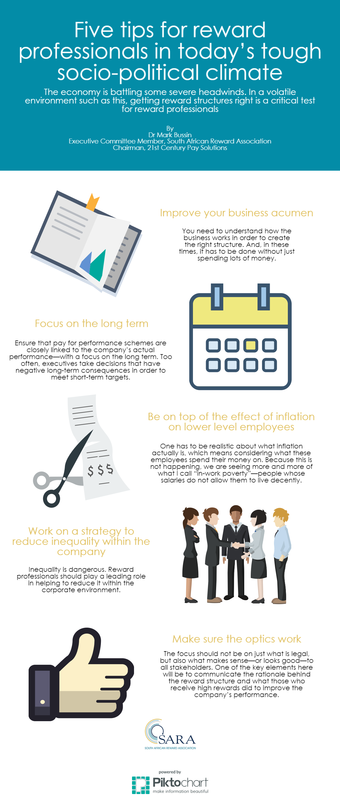The economy is battling some severe headwinds. In a volatile environment such as this, getting reward structures right is a critical test for reward professionals. By Dr Mark Bussin, Executive Committee Member, South African Reward Association (SARA) and Chairman of 21st Century We all know that our country and its economy face enormous challenges at present. As reward professionals, we need to face the fact that these headwinds are creating a highly combustible environment across society and within companies as well. How a company rewards its employees has become one of the flashpoints in this environment—a great risk but also a great opportunity for the reward professional. Get it wrong, and we can fan the flames of resentment into an inferno; get it right, and we can help create a corporate culture based on performance. Let’s just remind ourselves of what these headwinds actually are, and why they make reward policies such a critical corporate issue. Perhaps the most significant is that the economy is now officially not going to grow at all this year, which will greatly exacerbate the already high levels of unemployment. According to the Organisation for Economic Cooperation and Development (OECD), South Africa has an unemployment rate of 25.4 percent, the worst of all the countries they list—and I think the figure is actually higher. This creates a situation of huge inequality in the country, something that creates social instability. The same is true within companies, where the gap between what executives and lower paid employees receive is large and growing. The effect on corporate culture is devastating. The most toxic ingredient of this witches’ brew has to be inflation, which has been eating into the value of everybody’s salaries but, of course, hitting the lowest earners hardest. Our official rate of inflation is 6 percent but that does not reflect the reality of the man in the street—food and transport inflation, two of the biggest items in his or her basket, have been growing much faster. For many people, inflation is much, much higher than 6 percent. In other words, somebody who has been getting a CPI-linked raise every year is having the actual spending power eroded quite dramatically. In the Internet Age, in which transparency is a standard of governance, the mere fact that the CEO is earning millions in options and bonuses eats like acid into peoples’ minds. Equally important, companies, like nations, need great leaders to be successful. CEOs and other executives carry an enormous burden of responsibility and expectation and the new Companies Act makes them personally liable for any decisions that go wrong. All of these factors mean they can and do command very high rewards. Against this backdrop, it is clear that reward professionals have their work cut out to create a reward structure that properly incentivises everybody in the company—but it’s never been more important to get it right. There are many issues to be considered, but these must be the top five: Improve your business acumen You need to understand how the business works in order to create the right structure. And, in these times, it has to be done without just spending lots of money. Focus on the long term Ensure that pay for performance schemes are closely linked to the company’s actual performance—with a focus on the long term. Too often, executives take decisions that have negative long-term consequences in order to meet short-term targets. For example, reducing head count may help meet cost-reduction goals but jeopardise the company’s sustainability. Be on top of the effect of inflation on lower level employees Get a good fix on the salaries at the bottom of the pay scale, and the effect of inflation on these employees. As noted above, one has to be realistic about what inflation actually is, which means considering what these people spend their money on. Because this is not happening, we are seeing more and more of what I call “in-work poverty”—people whose salaries do not allow them to live decently. Work on a strategy to reduce inequality within the company As I have argued, inequality is dangerous. Reward professionals should play a leading role in helping to reduce it within the corporate environment. Make sure the optics work By this I mean that the focus should not be on what is legal, but what makes sense—or looks good—to all stakeholders. One of the key elements here will be to communicate the rationale behind the reward structure and what those who receive high rewards did to improve the company’s performance. ENDS MEDIA CONTACT: Cathlen Fourie, 012 644 2833, [email protected], www.atthatpoint.co.za For more information on SARA please visit: Website: www.sara.co.za Twitter: @SA_reward LinkedIn: South African Reward Association Facebook: SARA – South African Reward Association
0 Comments
Leave a Reply. |
Archives
March 2023
Welcome to the South African Reward Association newsroom.
Categories
All
|


 RSS Feed
RSS Feed